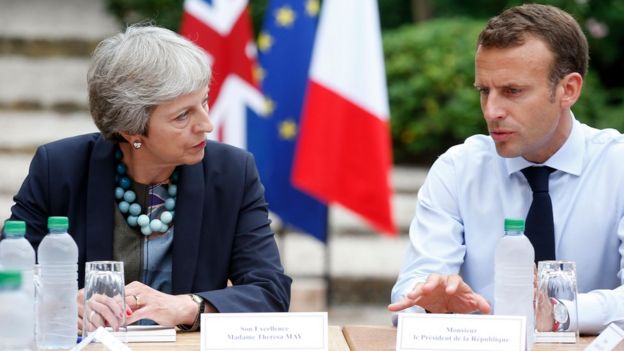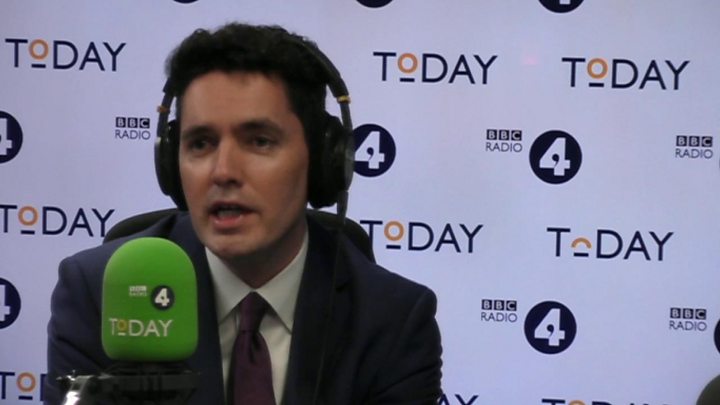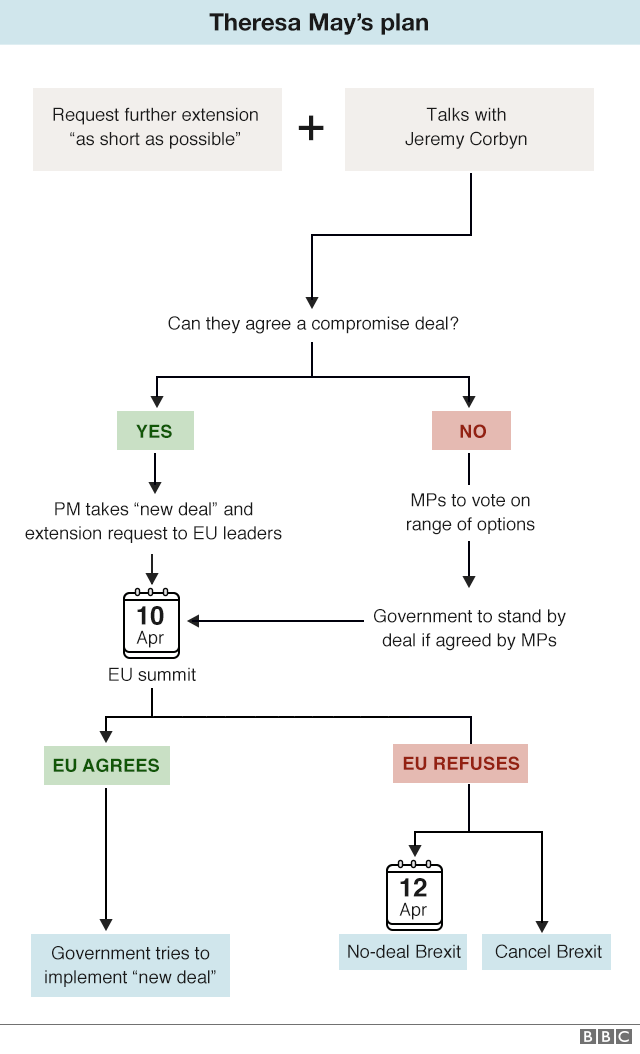Theresa May is holding last-minute Brexit talks with the leaders of Germany and France, with the UK due to leave the EU in three days’ time.
Mrs May met Angela Merkel in Berlin, and will meet Emmanuel Macron in Paris, as she urges both to back her request to delay Brexit again until 30 June.
After the talks, Ms Merkel said a delay that runs to the end of the year or the start of 2020 was a possibility.
There is a summit on Wednesday when all EU states will vote on an extension.
Cross-party talks in Westminster aimed at breaking the impasse are also continuing.
The negotiating teams include Chancellor Philip Hammond, Environment Secretary Michael Gove and shadow chancellor John McDonnell, with the Labour frontbencher saying they hoped to “broaden the talks”.
But in a leaked letter seen by the Telegraph, International Trade Secretary Liam Fox has warned that agreeing with Labour over its demand for a customs union is the “worst of both worlds” and will leave Britain unable to set its own trade policy.
The UK is currently due to leave the EU at 23:00 BST on Friday.
Downing Street said Theresa May and Ms Merkel discussed the UK’s request for an extension of Article 50 – the process by which the UK leaves the EU – to 30 June, with the option to bring this forward if a deal is ratified earlier.
The prime minister and Chancellor Merkel agreed “on the importance of ensuring Britain’s orderly withdrawal”, a statement said.
Ms Merkel said EU leaders would discuss a “flextension” – a one-year flexible extension – at Wednesday’s summit.
Following a meeting of the EU’s General Affairs Council in Luxembourg, diplomats said “slightly more than a handful” of member states spoke in favour of a delay to 30 June and a majority were in favour of a longer extension.
BBC Brussels reporter Adam Fleming said no maximum end extension date was agreed, although December 2019 and March 2020 were mentioned.
Conditions of a delay were discussed including UK participation in May’s European Parliament elections, no re-opening of the withdrawal agreement and how to guarantee the UK’s pledge of “sincere co-operation” in ongoing EU business.
So far, MPs have rejected the withdrawal agreement Mrs May reached with other European leaders last year.
One of most contentious parts of the plan is the Irish backstop – an insurance policy that aims to prevent a hard border returning to the island of Ireland.

The EU has continually said it will not re-open the withdrawal agreement for negotiations, but Leader of the Commons Andrea Leadsom renewed her plea for them to look again.
On Monday evening, Parliament passed a bill brought by Labour MP Yvette Cooper, which aims to force the prime minister to request a Brexit extension – rather than leave the EU without a deal on Friday, which is the default position.
The government opposed the bill, saying it was unnecessary as Mrs May was already seeking an extension. But the backbenchers behind it wanted to ensure it became law to prevent any changes in her strategy.
As a result, MPs are debating a government motion asking MPs to approve the PM’s request to the EU to delay Brexit.
 Mrs May is expected to set out to Mr Macron her rationale behind seeking a further delay to Brexit
Mrs May is expected to set out to Mr Macron her rationale behind seeking a further delay to BrexitThe final decision on an extension lies with the EU – and the leaders of all the 27 other EU countries have to decide whether to grant or reject an extension.
If the UK is still a member of the EU on 23 May, it will have to take part in European Parliamentary elections.
Luxembourg’s Foreign Minister Jean Asselborn said the UK would “certainly not” leave without a deal on Friday.
But Ireland’s Deputy Prime Minister Simon Coveney said a no-deal Brexit was still possible – even though it would represent “an extraordinary failure of politics”.


EU leaders are curious to hear the prime minister’s Plan B. They hope there is one, although they’re not convinced.
They want to know, if they say yes to another Brexit extension, what it will be used for.
And they suspect Theresa May wants them to do her dirty work for her.
EU diplomatic sources I have spoken to suggest the prime minister may have officially asked the EU for a short new extension (until 30 June) as that was politically easier for her back home, whereas she believed and hoped (the theory goes) that EU leaders will insist instead on a flexible long extension that she actually needs.
The bottom line is: EU leaders are extremely unlikely to refuse to further extend the Brexit process.
Labour leader Jeremy Corbyn has said that the ongoing talks “have to mean a movement” in the government’s policy, but said so far there had been “no change”.

Mr Hammond told the Commons that the deal the PM had negotiated “gave us many of the benefits of being in a customs union”, yet it had been rejected by MPs several times.
“We have to pursue other alternatives,” he added.
EU chief negotiator Michel Barnier said the EU has “hope and expectation” from the cross-party talks and would be willing to “improve” the political declaration “within hours”.
If no cross-party compromise can be reached, Mrs May has committed to putting a series of Brexit options to the Commons and being bound by the result.
This could include the option of holding a public vote on any deal agreed by Parliament.
Tory MP and government aide to the chancellor, Huw Merriman, said he backed a “People’s Vote” to secure the public’s support for the prime minister’s deal.
Speaking at a rally for the campaign, he said it was “seriously wrong” that he had been threatened with the sack, and said he wanted another vote in order to “get this country through the mess we are currently in”.

Key dates in the week ahead
- Tuesday: Theresa May travels to Berlin for talks with German Chancellor Angela Merkel and then Paris for discussions with French President Emmanuel Macron. Cross-party talks continue. Commons to vote on motion regarding extension
- Wednesday: Emergency summit of EU leaders to consider UK request for further extension until 30 June, with the option of an earlier Brexit day if a deal can be agreed
- Friday: Brexit day, if UK is not granted a further delay

–
Source: BBC
